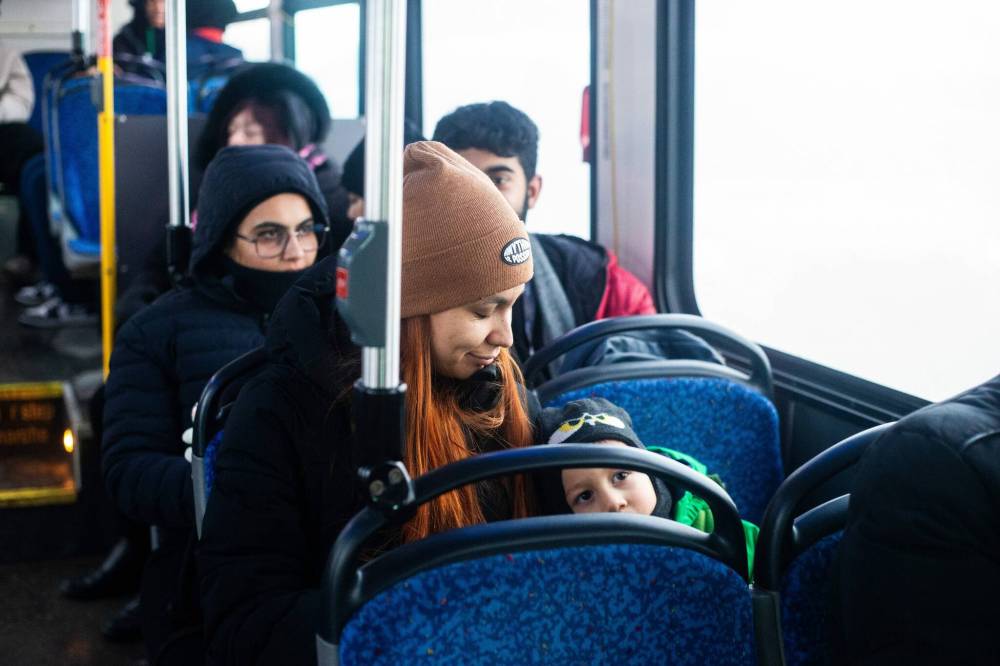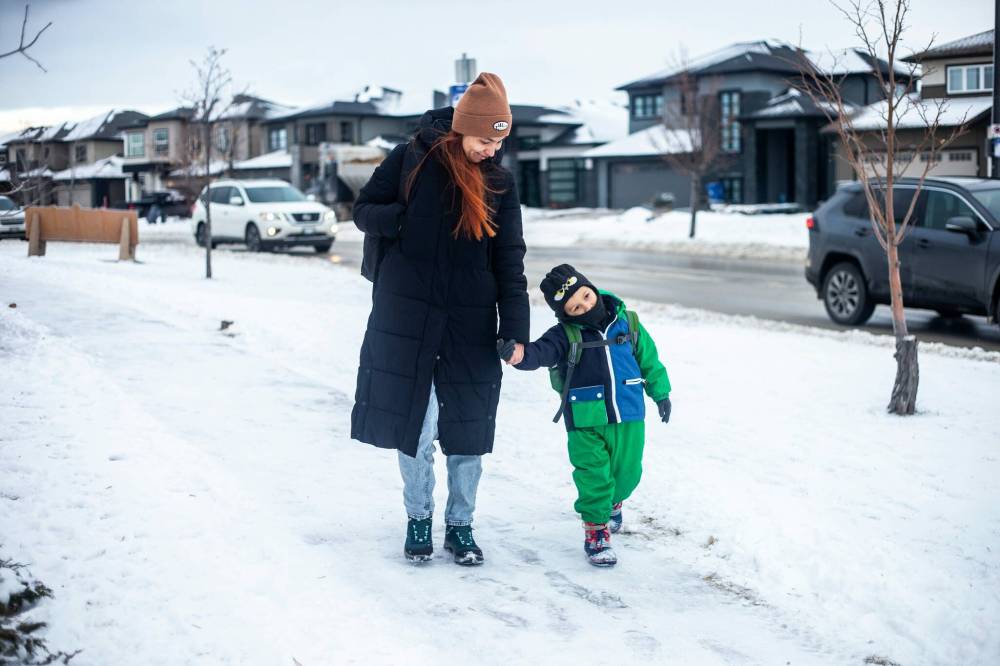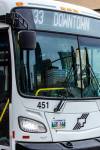Barriers on the bus Language, technology, fares, scheduling — issues that might seem small to some can be monumental for newcomers
Read this article for free:
or
Already have an account? Log in here »
To continue reading, please subscribe:
Monthly Digital Subscription
$1 per week for 24 weeks*
- Enjoy unlimited reading on winnipegfreepress.com
- Read the E-Edition, our digital replica newspaper
- Access News Break, our award-winning app
- Play interactive puzzles
*Billed as $4.00 plus GST every four weeks. After 24 weeks, price increases to the regular rate of $19.95 plus GST every four weeks. Offer available to new and qualified returning subscribers only. Cancel any time.
Monthly Digital Subscription
$4.99/week*
- Enjoy unlimited reading on winnipegfreepress.com
- Read the E-Edition, our digital replica newspaper
- Access News Break, our award-winning app
- Play interactive puzzles
*Billed as $19.95 plus GST every four weeks. Cancel any time.
To continue reading, please subscribe:
Add Free Press access to your Brandon Sun subscription for only an additional
$1 for the first 4 weeks*
*Your next subscription payment will increase by $1.00 and you will be charged $16.99 plus GST for four weeks. After four weeks, your payment will increase to $23.99 plus GST every four weeks.
Read unlimited articles for free today:
or
Already have an account? Log in here »
Hey there, time traveller!
This article was published 29/12/2023 (771 days ago), so information in it may no longer be current.
On a particularly cold December day, a dozen or so women — newcomers to Canada — are finishing their afternoon English class at Fort Garry Mennonite Brethren Church.
In Transit
A special series examining the state of Winnipeg’s public transportation system
Among them is Venera Sorkina, who came to Winnipeg from Russia with her husband and two children just three months ago. She listens intently, nodding along. Today’s lesson is particularly Manitoban in design — the teacher is breaking down the dos and don’ts of attending a social.
When 3 p.m. hits, Sorkina prepares to undergo another Winnipeg tradition: navigating the city’s public transit system in the dead of winter.
The class is meant to be accessible to people marginalized by the process of coming to Canada, and it includes a no-cost daycare for the parents in a nearby room. Sorkina picks up her son, three-year-old Ivan, and begins the arduous process of getting a wriggling toddler into snow pants and several warm layers.

Venera Sorkina and her son, Ivan, on the first bus they take home from Mosaic’s English language class.
Sorkina can only be described as gregarious: She laughs and jokes while talking positively about three months of busing in Winnipeg, while fitting Ivan’s feet into tiny snow boots.
“I like good (bus) drivers, because they are friendly. Sometimes they are serious, but often, they are friendly and smiling and say, ‘Have a nice day,’” she says. “This is great for me, because in my country, drivers don’t smile.”
Her friendliness is apparent as she and her son board the two buses needed to get to their south-end apartment. She waves and chats with other route regulars, and credits the journey for improving her English language skills.
However, it’s not always easy. Today, it’s a frigid wait for one bus and then a connecting transfer without heated bus shelters. Sorkina’s smile fades as she describes the multiple times a scheduled 25-minute bus ride has stretched to more than 90 minutes as a result of delays and cancellations, leaving her and her young son in the cold.
MIKAELA MACKENZIE / WINNIPEG FREE PRESS Venera Sorkina and her son, Ivan, walk home after taking the bus.
“I feel sad. Once, in November, it was cold, and my son cried. He said, ‘I’m froze, Mommy.’ It is sad for me. I’m OK, he’s not OK,” she says.
The shortcomings of Winnipeg’s transit system has meant the pair will wait in the nearby McDonald’s to warm up if buses are especially late, and Sorkina will encourage Ivan to play with other children waiting for the bus with their parents to make up for time not spent playing together at home.
But Sorkina is unfailingly positive. Her husband is about to take his driver’s licence road test. If he passes, she hopes they’ll be able to buy a car. She’s happy that he’ll be able to drive to work and her children will be able to ride in a safe and warm vehicle — but she has no plans to stop taking the bus.
“It’s like a family,” she says while seated on a 676 Bus (Bridgwater-River Road), before breaking into another laugh.
People with disabilities less likely to use wider public transit
Melissa Graham knows first-hand that using Winnipeg Transit as a person with a disability forces everyday occurrences to become moments of advocacy.
She’s the executive director of the Manitoba League of Persons with Disabilities (MLPD), having moved to Winnipeg last year. Previously she spent years as a disability justice advocate in Ontario and had founded Toronto’s disability pride march. Using Winnipeg Transit means she regularly is having to fight for use of the system’s limited accessibility options.
“If I have to take the extra time to really ask the driver, ‘I need you to (flip up) the chairs for me, I need you to ask people to move,’ or if I’m the one shouting to passengers, ‘Can you please move for me so I can get in?’ I’m a fairly confident person with the skills to do that,” she said.
“But that’s a lot to ask of a passenger. Passengers shouldn’t have to be doing that labour just to get from A to B.”
Melissa Graham knows first-hand that using Winnipeg Transit as a person with a disability forces everyday occurrences to become moments of advocacy.
She’s the executive director of the Manitoba League of Persons with Disabilities (MLPD), having moved to Winnipeg last year. Previously she spent years as a disability justice advocate in Ontario and had founded Toronto’s disability pride march. Using Winnipeg Transit means she regularly is having to fight for use of the system’s limited accessibility options.
“If I have to take the extra time to really ask the driver, ‘I need you to (flip up) the chairs for me, I need you to ask people to move,’ or if I’m the one shouting to passengers, ‘Can you please move for me so I can get in?’ I’m a fairly confident person with the skills to do that,” she said.
“But that’s a lot to ask of a passenger. Passengers shouldn’t have to be doing that labour just to get from A to B.”
Each bus is equipped with a mechanical ramp at the front door and the first rows of seats are designed to be flipped up to provide more room for those with wheelchairs, baby strollers or wagons.
A 2020 public engagement survey from the City of Winnipeg found 90 per cent of respondents had witnessed or experienced a lack of space at the front of the bus for mobility aids and strollers, and 80 per cent had seen conflicts as a result of that limited space.
Respondents who had a disability said their most commonly experienced barrier was a “lack of community understanding” around invisible disabilities.
Graham, who uses a wheelchair, is more likely to use (and much of the MLPD’s advocacy work focuses on) Transit Plus, the door-to-door service that can be scheduled to pick up and drop off people with physical disabilities.
It comes with its own shortcomings — Transit Plus is known for its long wait times and dropped bookings, Graham said, and that experience makes people with disabilities even less likely to attempt using wider public transit.
“The (Transit Plus) system barely meets people’s needs, if it does. So when there’s a lack of competence with the system that’s supposed to be for people with disabilities, it makes it that much more difficult, I think, for people to feel comfortable taking the regular transit that their needs are going to be met,” she said.
“I don’t think the city understands yet that the way transit systems are organized right now are still creating barriers for people.”
Transit Plus recently held off on its plans to change how it responds to late cancellation and no-shows after pushback from the community, but some changes are coming for the service: an online booking system (riders can only book by phone currently) is in the works for 2024.
The city is also working to begin a review of the eligibility criteria to receive Transit Plus service to align with the Accessibility for Manitobans Act’s standards through working with a consultant and public outreach.
A city spokesperson said their priority would be focused on improving the core issues users have with Transit Plus in the coming year.
The MLPD is focusing on advocating for better snow-clearing at bus stops and more Transit Plus access in 2024. Graham said public education and getting people with disabilities involved at the policy-making level are necessary to make the cultural shift.
“It’s honestly like many things in the city. I think we have good ideas on paper, but it’s the follow-through, it’s making sure that accessibility becomes this ingrained perspective,” she said.
“So it’s not seen as, ‘Look at this nice thing the city is doing,’ but making the city understand that accessibility is a right. And I don’t think it’s treated that way.”
There were 4,489 people registered for Transit Plus in 2022, including 1,923 new applicants, and 245,682 Transit Plus trips.
According to Transit Plus’s first annual report, released in June 2023, the service received 1,370 total complaints in 2022. The annual report reviewing 2023 will be released in the new year.
Hearing about bus challenges is not new at the Mosaic Newcomer Family Resource Network, which offers the English classes Sorkina takes. Transit barriers that might seem small to some can be monumental for newcomers.
It’s a “significant” challenge for Mosaic when trying to connect newcomers to the resources they need to integrate into the city, like language classes, income support and employment outreach, founder Val Cavers says.
“One of our goals is to locate our programs as close as possible to where groups of newcomers are settling, just to reduce those barriers, reduce the barrier of child care and transportation, but it’s obviously not always possible,” she says.
“But it’s a significant enough barrier for us to try and plan our programs around it, so that people don’t have to take transit.”
At Mosaic, the prohibitive cost of bus fares is the most common reason clients cite for being unable to take transit to attend programs, even with the low-income WINNpass, which reduces fares by 50 per cent for those eligible. A full-price adult fare is currently $3.25 as of Jan. 1. Cavers says Mosaic students attending downtown programs often used the free Downtown Spirit bus until it was shut down by the city in 2020.
Another reason cited is scheduling. Suburban neighbourhoods that are seeing high numbers of newcomers, including Bridgwater and Sage Creek, have few transit options compared to the city’s centre. While simply arriving earlier and waiting might seem like the easy solution, many are coming with young children, and some don’t have much experience with cold weather. Because of Transit scheduling gaps, it’s not unusual to see people waiting outside until the church unlocks its doors for their two-hour class, Cavers says.
“We’re talking about mostly newcomer moms and preschool-aged kids that don’t have access to vehicles. They’re usually dependent on other people just to get them places,” she says. “If they can come by themselves walking, that’s great, but if they’re on the bus, they have extra issues.”
Winnipeg Transit is currently in the process of improving its Travel Training program, including hiring a new staff member. The program hosts instructional sessions for people unfamiliar with Winnipeg Transit’s trip-planning, accessibility features and new customer information technology.
The city offers to work with community organizations and disability groups to develop new training materials and train staff at those organizations to provide the same travel resources to their own clients.
“Winnipeg Transit’s customer service division works closely with organizations supporting newcomers as they adjust to life in Winnipeg, and we are committed to doing our part to remove barriers,” the spokesperson said in an email.
Cavers says, however that in her 14 years leading Mosaic, she’s only seen the city’s transit get less accessible for the people she serves.
“Portage Avenue is eight lanes wide. It’s really crazy,” she says. “Can’t one of them be a dedicated transit (lane)? Where every 10 minutes, there’s a bus going from Polo Park to Portage and Main?”
“Portage Avenue is eight lanes wide. It’s really crazy. Can’t one of them be a dedicated transit (lane)? Where every 10 minutes, there’s a bus going from Polo Park to Portage and Main?”–Val Cavers
Her concerns are not unique to newcomers, but they are common to Manitoba’s high numbers of low-income transit users. Statistics Canada data from 2021 show the average yearly income of employed Winnipeggers who use public transit is $29,440, compared to the city-wide average of $46,400. Refugees and recent immigrants remain over-represented in the country’s numbers of people in poverty.
In 2021, Point Douglas Coun. Vivian Santos forwarded a motion to develop a report on free or $1 bus fare for all Winnipeg Transit, but it was defeated. Then in a 2022 review of potential changes, Winnipeg Transit stated fare reductions would require purchasing more buses.
At Functional Transit Winnipeg, a grassroots group that advocates for public transit improvement, president Kyle Owens says the city’s funding decisions have shown transit accessibility is a low priority.
“Transit is implicitly, or explicitly, for people who have no other choice … the fact is that the Transit system, for many years, has been designed that way,” he says.
“It has been designed to only be used for people who are really desperate, and the funding for transit has reflected that assumption, that people will just have to make do because we can’t afford any better, that the bus service will be accepted by everyone, because what choice do they have?”
“A transportation system that gives people access to their own life is a game changer.”–Kyle Owens
Owens says while niche projects that tackle singular programs will get large sums of money, that same amount of money could be used for relatively inexpensive changes that could make taking the bus easier for those who use them most.
He pointed to Vancouver, where the entire schedule for every bus is posted at the physical stop as an inexpensive fix for riders without smartphones. Even making the website for reloading the electronic Peggo fare card easier to navigate for elderly people or those learning English could make a massive difference, he says.
It would also change the lives of the city’s growing population of “time-poor” Winnipeggers — folks who have found themselves working more, commuting more, and spending more time away from loved ones in the face of the rising cost of living.
“The benefits of transit are not necessarily in convenience, but simply in giving you more of your day back. You have so much more time to access things that you need, access services, access the doctor, getting to the grocery store, getting medicine, getting to the pharmacy,” Owens says.
“The lack of that time in people’s lives means that they have to make really difficult decisions all the time, Because they just can’t get where they need to be quickly and easily. A transportation system that gives people access to their own life is a game changer.”
malak.abas@freepress.mb.ca

Malak Abas is a city reporter at the Free Press. Born and raised in Winnipeg’s North End, she led the campus paper at the University of Manitoba before joining the Free Press in 2020. Read more about Malak.
Every piece of reporting Malak produces is reviewed by an editing team before it is posted online or published in print — part of the Free Press‘s tradition, since 1872, of producing reliable independent journalism. Read more about Free Press’s history and mandate, and learn how our newsroom operates.
Our newsroom depends on a growing audience of readers to power our journalism. If you are not a paid reader, please consider becoming a subscriber.
Our newsroom depends on its audience of readers to power our journalism. Thank you for your support.





















